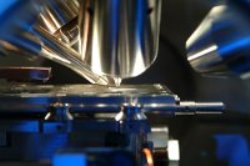X-ray Photoelectron Spectroscopy (XPS) machines currently allow the study of only solid substances. In what is touted as a breakthrough that would facilitate atomistic measurements of liquid surfaces, the University of Nottingham has announced that it is all set to unveil the world’s first Liquid Phase Photoelectron Spectroscopy (LiPPS) machine at its Nottingham Nanotechnology and Nanoscience Centre (NNNC).
 LiPPS
LiPPS
The tool is expected to open up further avenues of research in various high-value industries such as aerospace, semiconductors and pharmaceuticals. The tool has been built on a grant of £675,000 from the Engineering and Physical Sciences Research Council (EPSRC). NNNC will be collaborating with the Photoelectron Spectroscopy Center at Newcastle University amongst other such centers.
The facility will support training in research, and industries will have open access to carry out their own research. The tool will provide information on interfacial structure and solute composition of electrode based systems which will help in strengthening the knowledge of solute-based processes that find applications in aeronautics and automotive industries.
Professor David Greenaway, Vice-Chancellor of The University of Nottingham, stated that commissioning of this tool has paved the way for advances in nanotechnology with the University at the helm. This announcement comes in the wake of another significant achievement by the University in nanotechnology research. The university along with its business arm, Promethean Particles, has bagged a nanotechnology research project worth €9.7 million in the European Union.
Ms. Emily Smith from the University has played a pivotal role in the development of the XPS machine and has been supported by Dr Peter Licence and his team who have the ionic liquid surface science discovery to their credit.